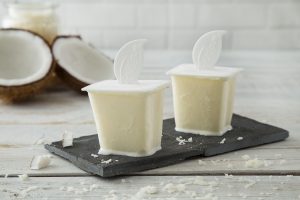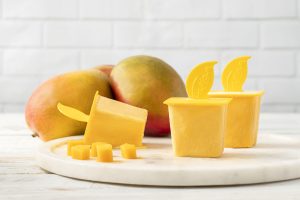Juan and German Puerto of Miami come from a long line of business owners in Colombia. So it wasn’t a hard decision to take on the challenge of growing a tropical ice cream brand, Fruitique, started by their father and inspired by their heritage.
 The brothers joined the company full-time about four years ago and for them the challenge was straight-forward: How to get those luscious, exotic flavors “that will make your taste buds dance” – coconut, passion fruit, mamey and guanabana, among them – into more mouths, even beyond Miami.
The brothers joined the company full-time about four years ago and for them the challenge was straight-forward: How to get those luscious, exotic flavors “that will make your taste buds dance” – coconut, passion fruit, mamey and guanabana, among them – into more mouths, even beyond Miami.
The timing was right for the premium ice cream product they developed: In the past few years, consumer tastes have been shifting to more healthy (some Fruitique ice cream bars are just 50 calories), local, simple, natural foods, a trend powered largely by millennials like Fruitique’s brotherly co-founders.
“We have a really good product and we saw the opportunity that with a team effort we would be able to grow this company,” said German, who studied business and finance at St. Thomas University and worked in sales for another company before jumping into the family business full-time. “We wanted to make an impact. There was not a premier manufacturer of tropical ice cream bars. We saw the opportunity and wanted to make a change in the industry,” said Juan, who studied hospitality management at FIU and has taken more culinary courses in the ice cream specialty.
For any small business, sales is a learning process. In the beginning, the family was seizing any opportunity – a smattering of local restaurants, convenience stores and independent grocers. But when the brothers joined the company full-time and began focusing more on branding, packaging and marketing (they also changed the company’s name), they began seeing double-digit annual growth.
 Still, there was something missing to take the company to the next level: a winning sales strategy including one for sales channels. Because each sales channel is unique, each time a small business sells to a customer in a different sales channel, say a retail customer instead of a local restaurant, the team has to learn a different sales process. So why not maximize the opportunity by targeting hard a strategic channel, rather than customer by customer?
Still, there was something missing to take the company to the next level: a winning sales strategy including one for sales channels. Because each sales channel is unique, each time a small business sells to a customer in a different sales channel, say a retail customer instead of a local restaurant, the team has to learn a different sales process. So why not maximize the opportunity by targeting hard a strategic channel, rather than customer by customer?
Companies that don’t act strategically with their sales risk plateauing – or stalling out – after some initial growth.
Since Fruitique started being more strategic with sales over the past year or two, the payoff has been sweet. Fruitique, now with 20 employees, expects to exceed $1 million in sales this year for the first time and sales are growing at an annual rate of 35%.
Today, Fruitique is selling its premium tropical ice cream products from Key West to Orlando, and the company now has a distributor for New England. In South Florida, the product is available in some Winn-Dixies, Milan’s, Presidente and Navarro’s, among other stores – but look for them in more destinations soon.
Shelly Bernal, a Florida SBDC at FIU consultant who has a wealth of experience in the food sector, has been helping the team with its sales and marketing strategy. Other SBDC consultants have been assisting Fruitique on financials.
“As the company grows, every time they tackle a new channel or a new segment we have to start the entire process over again – discovering it, learning about it, doing it right, if you will, and making sure all the pieces of the company line up to service well,” Bernal said. “A lot of companies don’t think about it – they say I want to grow, I want more customers – but what they don’t understand until they go through it is the impact that that has on the company and all that that entails in terms of structure to service well. If you go to the trouble of setting the company to service well, you might as well get as many as you can within that group to get the highest return on your investment.”
Now Fruitique has done the market research, and it is targeting the food-service category – museums, tourist attractions, water parks, airports, sports venues, hospitals. In fact, its number 1 account is a hospital. “We are going to chase the food-service segment most intensely, and in the background we will be creating the demand for retail channels,” said Juan, who was with his brother and their business development manager, Nick Moreno, exhibiting their company at the Florida Attractions Association conference this week.
“In retail, the competition is so high and with a small company it is hard to win … We are trying to differentiate with quality, the flavors we offer, the packaging is different, and we are seeing that in food service it is easier for us to present the message and for customers to see this company really has something different, more fresh, more natural,” added German.
In working with the company through SBDC at FIU, the small business development center within FIU’s College of Business, Bernal first wanted to understand the customer base in all kinds of ways – who are Fruitique’s large and small customers, the clients that pay in advance, the clients that pay on credit, all the different categories of customers and market segments. She also wanted to understand the channels of the market they were currently in.
“I ask a lot of questions about their existing business that causes reflection so they can make better strategic decisions,” she said. In Fruitique’s case, once she learned the company had a smattering of customers in different segments, “then we start to have a different conversation.”
Questions she asks:
- What would it look like if you were to pursue any of these segments?
- Can we do some analysis or get more information to determine whether one segment is better than another? (SBDC has a lot of resources to help small businesses with this.)
- Should we be spending more time for a higher return on one instead of the other?
“As they are growing very fast, they have lots of opportunities and they were taking advantage of any transactions but it was reactive, not proactive. But if so you don’t have control, you can’t forecast and that is a huge thing with a growing company. You want to forecast your capital needs in the future so you can stay ahead of it and you don’t outgrow yourself,” she said. “And for that you have to have a plan — you have to be strategic and proactive.”
Juan said SBDC has helped him understand strategic planning, the consumer packaged goods market, how to capture the customer’s attention with messaging and how to project and analyze sales. With the help of SBDC’s finance consultants, German, who focuses on the finance side of the business, understands that small business owners really needs to understand their numbers, and he has also taken some of the finance-related courses SBDC offers. Both said they will continue to use the free consulting services SBDC offers small businesses.
“As business owners our knowledge has to grow with the company,” said German. “As the stage of our company keeps changing, so do our needs,” adds Juan.
READ MORE: A strategic growth plan is not that thing you look at once a year. Here’s how to get started.
READ MORE: For this small business, growing sales means thinking outside the box
READ MORE: If you aren’t careful, you can sell your way to bankruptcy
Pictured at top of post: Juan Puerto, German Puerto and Nick Moreno of Fruitique exhibit the company at the Florida Attractions Association convention. All photos courtesy of Fruitique.
Please send GrowBiz topic suggestions and feedback to GrowBiz@FIU.EDU.

